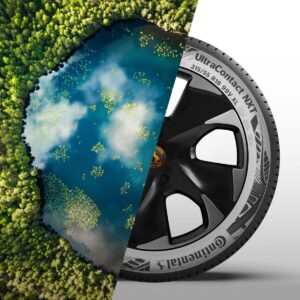Sustainability In Tyres
In GRI, showcased its commitment to environmentally conscious solutions at the recent “Sustainability in Tyres” conference held in Shanghai, China. The conference, organised by Smithers, a renowned entity with over 95 years of expertise in tyre testing, materials, and technology, served as a vital platform for industry professionals and stakeholders from the Asia-Pacific region to discuss the latest advancements in sustainability within the tyre industry.
Dr. Mahesha Ranasoma, CEO of GRI, took the stage as a distinguished speaker, delivering a compelling presentation titled “The Green Revolution of the tyre Industry: A Deep Dive into ESG Integration.”
Therefore, his talk drew the attention of industry leaders and highlighted GRI’s pivotal role in developing sustainable specialty tyres and green practices.
“Sustainability in Tyres” is a critical topic that addresses the environmental, social, and economic aspects of the tire industry with a focus on responsible and sustainable practices.
What can we learn about sustainability in tyres?
Here are some key points that TukTuk would like to share with you:
1. Environmental Impact:
Tyres have a significant environmental footprint due to their manufacturing processes, materials, and disposal. Sustainable practices aim to reduce this impact by using eco-friendly materials, minimising waste, and improving energy efficiency.
2. Tire Recycling:
Recycling tires is an essential aspect of sustainability. Used tires can be recycled into various products, including crumb rubber, construction materials, and fuel. This reduces waste and conserves resources.
3. Circular Economy:
A circular economy approach encourages tyre manufacturers to design products with recyclability in mind, promoting a closed-loop system where tyres are reused or recycled, reducing the need for new tyre production.
4. Eco-Friendly Technologies:
Sustainable tyre technologies, such as low-rolling resistance tires, reduce fuel consumption and greenhouse gas emissions. These tyres are designed to enhance vehicle fuel efficiency.
5. Ethical Labor Practices:
Ensuring fair labor practices in the tire industry is part of sustainability efforts. This includes fair wages, safe working conditions, and respect for labor rights.
6. Responsible Sourcing:
Sustainable tyre manufacturing involves responsible sourcing of raw materials, such as natural rubber. It aims to reduce deforestation, protect biodiversity, and support local communities.
7. Consumer Education:
Educating consumers on tire maintenance and making informed choices for sustainable tyres is essential. Therefore, proper tyre care can enhance fuel efficiency, extend tire lifespan, and reduce waste.
8. Regulations and Standards:
Governments and industry organisations set regulations and standards to guide sustainable tyre manufacturing, labelling, and disposal practices.
9. Research and Development:
Continuous research and development efforts focus on innovative, sustainable tire technologies that improve performance while reducing environmental impact.
10. Challenges and Opportunities:
Sustainability in tyres presents both challenges and opportunities for the industry. Meeting sustainability goals often involves overcoming technological, logistical, and economic challenges, but it can also lead to innovation and market advantages.
11. Future Trends:
Anticipated trends in the tire industry include the development of more sustainable materials, enhanced tyre recycling methods, and the rise of electric and autonomous vehicles, which will impact tyre design and usage.
12. Global Impact:
Sustainability in the tire industry is not just a local concern; it has a global impact due to the international nature of tire manufacturing and trade.
In conclusion, promoting sustainability in the tyre industry is crucial for reducing its environmental impact, conserving resources, and promoting ethical and responsible practices throughout the tyre lifecycle. Certainly, it is an ongoing effort that requires collaboration from various stakeholders to drive positive change.


